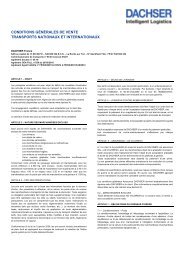You also want an ePaper? Increase the reach of your titles
YUMPU automatically turns print PDFs into web optimized ePapers that Google loves.
A lot is already gained if top performers – whether<br />
in sport or in business – focus on their role of being an<br />
example for others Dr Thomas Bach<br />
>> So<strong>und</strong>s good, but at the end of the<br />
day doesn’t it always come down to performance?<br />
B. Simon: Performance is the measurable<br />
result of strategic management. But success<br />
is based on a clearly defined corporate<br />
philosophy that is shared by all members<br />
of the company and builds on uniform<br />
values. This has to be <strong>und</strong>erstood and lived<br />
equally all over the world and at all corporate<br />
hierarchical levels. If this is the<br />
case, motivation and a sense of belonging<br />
will generally also result in enhanced performance.<br />
Th. Bach: Performance always results<br />
from a number of different factors. But creating<br />
the basis for success requires many<br />
years of training, staying power, energy,<br />
discipline and ambition. That’s something<br />
I have come to know from all sides in my<br />
career as a fencer. Add to this the fair<br />
play ideal. To my mind, it is this above all<br />
that turns successful athletes into role<br />
models. A lot is already gained if top performers<br />
– whether in sport or in business –<br />
focus on their role of being an example<br />
for others.<br />
>> How can top performance be leveraged<br />
in companies’ everyday business<br />
activities?<br />
B. Simon: <strong>Co</strong>mpetition generates creativity<br />
and innovation and is an incentive to perform<br />
better. Just as in sports, companies need<br />
a clearly defined performance plan with<br />
meaningful milestones. This produces stringent<br />
workflows and creates a motivating<br />
sense of achievement.<br />
But top performances are also the result of<br />
consolidating competences and knowledge<br />
management. Just compare this to an<br />
Olympic team. It is made up of different talents:<br />
one person fences, the other swims. In<br />
the same way, at <strong>Dachser</strong> we promote individual<br />
skills and consolidate them to build<br />
powerful project teams. In this context,<br />
knowledge is not a private asset, but a production<br />
factor that is networked throughout<br />
the entire organization.<br />
>> It seems some athletes believe they<br />
can only live up to the Olympic motto<br />
“faster, higher, stronger” with doping.<br />
How does this affect the rules of the<br />
game?<br />
Th. Bach: Unfortunately, just as in other areas<br />
of life, in sport, too, some people want<br />
success at any price and are prepared to go to<br />
any lengths to achieve it. As people with responsibility,<br />
we should therefore protect honest<br />
performers. Above all by showing a zerotolerance<br />
approach to doping. Sport, incidentally,<br />
is so far the only social community<br />
to prohibit doping. You won’t find any such<br />
ban in ballet, mountaineering, music, business<br />
or politics.<br />
B. Simon: Fair play also implies integrity<br />
and honesty. Respect and tolerance in our<br />
contacts with each other are therefore firmly<br />
anchored in our corporate values. We keep<br />
our promise and create transparency on all<br />
levels, vis-à-vis customers, competitors and<br />
our staff. We are also familiar with the legal<br />
limitations of our business and adhere to<br />
these strictly.<br />
>> Victories only really become meaningful<br />
through defeats. Does this statement<br />
in fact also apply to business?<br />
B. Simon: Oh yes, because even in a<br />
business context it’s an accepted fact that<br />
you learn from your mistakes. <strong>Dachser</strong><br />
views itself as a “learning organization”.<br />
Even an unawarded tender is no reason to<br />
bury your head in the sand. Indeed, then<br />
more than ever, it’s important to precisely<br />
analyze the selection procedure to see<br />
what went wrong, and then turn this to advantage<br />
for future projects. And if we don’t<br />
win over a customer until the second or<br />
third attempt, then the satisfaction is all the<br />
greater.<br />
>> Former Federal <strong>Co</strong>nstitutional <strong>Co</strong>urt<br />
judge, Professor Udo Steiner, once<br />
said: “<strong>Co</strong>mpanies don’t need competition,<br />
but sport thrives on it” – What<br />
does this statement mean for fair competition?<br />
Forum: <strong>Dachser</strong> face-to-face<br />
Dr Thomas Bach<br />
is Vice-President of the International<br />
Olympic <strong>Co</strong>mmittee and<br />
President of the German Olympic<br />
Sport Federation. The 56-yearold<br />
commercial lawyer from<br />
Tauberbischofsheim was world<br />
fencing champion in 1976 and<br />
1977, and in 1976 achieved<br />
Olympic gold in Canada with the<br />
foil fencing team in Montreal.<br />
Bernhard Simon<br />
is spokesman for the <strong>Dachser</strong><br />
management. The family-run<br />
company relies on well-rehearsed<br />
teams of associates for whom<br />
a “climate of cooperation<br />
and mutual responsibility” is a<br />
decisive factor of success.<br />
Th. Bach: For a company, it may be<br />
attractive not to have any competition, but<br />
for an athlete, beyond a training situation,<br />
it would be pretty unappealing. Athletes<br />
always strive to measure themselves against<br />
the best and rely on the fact that the rules<br />
of fair play apply to athletes all over the<br />
world. These are what help to maintain fair<br />
competition and promote the competitiveness<br />
of athletes and associations. At the<br />
end of the day, this is what makes sport<br />
appealing to spectators.<br />
B. Simon: For companies, a lack of competition<br />
is anything but attractive. In business<br />
as in sport, competition stimulates productivity.<br />
This is what drives the necessary and<br />
ongoing self-reflection and innovation. And<br />
what consequently produces ever new market<br />
opportunities.<br />
Th. Bach: In sport the same applies as in<br />
business: when it comes to being competitive,<br />
mutual respect and fair play are what<br />
count. However, this is something we continually<br />
have to work at, not only in sport,<br />
but in all walks of life.<br />
You can find the full-length interview on<br />
the Internet at the following link<br />
www.dachser.com/discussion<br />
DACHSER magazine 09




